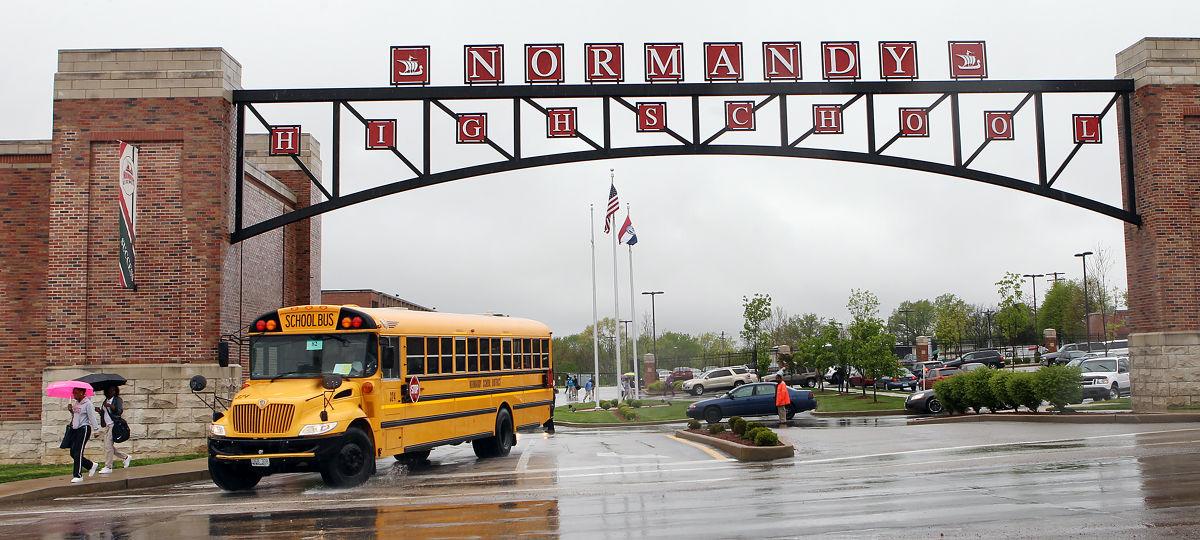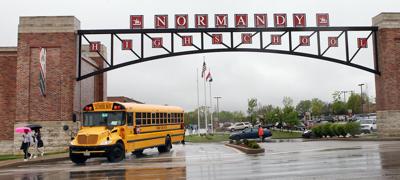ST. LOUIS COUNTY — The state plans to relinquish control of its two most troubled school districts despite failing to turn around their poor academic performance for a generation of students.
Students in Normandy and Riverview Gardens had the lowest math and English proficiency rates of any school district in Missouri in 2022. More than half of students are chronically absent. Enrollment is in free-fall, and hiring teachers is a constant struggle.
The Missouri Board of Education on Tuesday will vote on returning control of the school districts to elected boards through the recommendation of state education commissioner Margie Vandeven. By summer, the task of improving the provisionally accredited districts could fall entirely to elected school board members for the first time in more than a decade.
“I feel like it’s time,” Vandeven said. “We’re responding to very clear requests from the local communities who are very aware that these state-appointed boards are usually designed for a temporary solution.”
People are also reading…
Vandeven acknowledged that while the state takeovers brought stability to district finances and governance, there is a “tremendous amount of work to be done” on the academic side. It will take local business leaders, clergy and parents along with continued support from state leaders, she said.
“It’s becoming clearer and clearer to us that the community and the schools need to really work together to drive home the importance of educating our children,” she said.
Takeovers have limited record
State takeovers of public school districts have rarely led to significant academic improvements, according to a 2021 report from St. Louis University that was commissioned by the Missouri Department of Elementary and Secondary Education.
Further, a “deep review of the existing evidence uncovered no clear guidelines from research or practice on how to successfully exit a state intervention,” the report reads.
Both north St. Louis County districts have been hammered by factors out of their control since the state takeovers in 2010 for Riverview Gardens and 2014 for Normandy. Nearly all the students in both districts are Black and living in poverty.
In 2013, state law gave students the right to transfer out of the then-unaccredited districts, which had to pay millions in tuition to higher performing schools. The police killing of Normandy graduate Michael Brown in 2014 set off months of protests followed by further hollowing out of neighborhoods. Most recently, the pandemic disproportionately affected low-income and Black families in both job losses and deaths.
Educators said the steep challenges in Normandy and Riverview Gardens must be studied in the historical context of their communities.
“It’s been blow after blow after blow, and I hope the answer isn’t just local control,” said Howard Fields, an assistant school superintendent in Kirkwood who worked as a teacher and principal in Riverview Gardens from 2008 to 2017. “On the topic of poverty, inadequate funding, in those districts in particular over decades, progress is going to require getting to the root cause.”
Decades of decline
Riverview Gardens started floundering in the 1990s from low test scores and sinking finances. In 2009, a former superintendent accused of stealing district funds was sent to jail for 30 days and ordered to pay more than $100,000 in restitution.
State education officials appointed a special administrative board to oversee Riverview Gardens in 2010 after three years in unaccredited status. The district would have to show “significant progress” before governance returned to an elected board, said then-state education commissioner Chris Nicastro.
When the state took over, 27% of Riverview Gardens students tested proficient in English and 17% in math. In 2022, they notched the worst test scores in the state — 12% proficient in English and just 2% in math, falling below even the Special School District of St. Louis County for students with learning disabilities.
Enrollment in kindergarten through high school has fallen below 5,200 from a high of 8,000 students in 2006. Homecoming celebrations were canceled last month after an outbreak of fights at Riverview Gardens High School.
Normandy’s troubles started decades ago but were exacerbated when the state mandated the district absorb the struggling Wellston schools in 2010.
State officials in turn dissolved the Normandy district in 2014 and created the Normandy Schools Collaborative led by a five-member appointed board. The district was then paying out $1.3 million a month to other districts taking Normandy transfer students, leading to teacher layoffs, a school closure and near bankruptcy.
At the time of the state takeover, 19% of Normandy students scored proficient on state tests in both English and math. By 2022, those scores dropped to 12% in English and 9% in math.
Meanwhile, enrollment in Normandy schools has fallen by more than half since the 1990s, to 2,800 last year. More than 600 of those students are homeless. Two out of three teachers don’t make it to three years on the job.
The state takeover was an “act of desperation” but not a magical fix, said Michael Jones, who voted to disband the Normandy School District as a state board member and later served as an appointed board member for the Normandy Schools Collaborative.
“There’s no bag of money or resources that come with a state takeover,” Jones said.
Financial disparities across school districts, demonstrated so sharply in St. Louis County, are a moral imperative if not a violation of equal rights under the 14th Amendment, Jones said.
“We would not let a school district of white children be that bad for that long,” he said.
A ‘weighty responsibility’
The return to elected boards in Normandy and Riverview Gardens started gradually with the elections of two or three members in April of 2022 and 2023. By June 2024, both districts will have seven elected members who live in their boundaries.
The last district to overcome a takeover was St. Louis Public Schools, which was turned over to an elected board in 2019 after 12 years of state control.
During the state intervention, SLPS graduation rates increased from 56% to 78%. But enrollment steadily dropped, and test scores remained well below the state average. The return to elected leaders has coincided with the pandemic, which has skewed performance metrics nationwide.
Normandy and Riverview Gardens will certainly benefit from the intangibles of local control, said Dorothy Rohde Collins, who was president of the SLPS elected board when it regained power.
School boards enact policies that shape communities, from real estate to employment opportunities, in addition to the role they play in improving academic outcomes, Rohde Collins said.
“There’s something to be said about living in the school district that you serve,” she said. “You feel a weighty responsibility when the impact of your decisions are being carried out on your neighbors, your friends and your children’s classmates.”
Photographs from St. Louis Post-Dispatch staff and freelancers for the week beginning Oct. 8, 2023. Video by Beth O'Malley


















